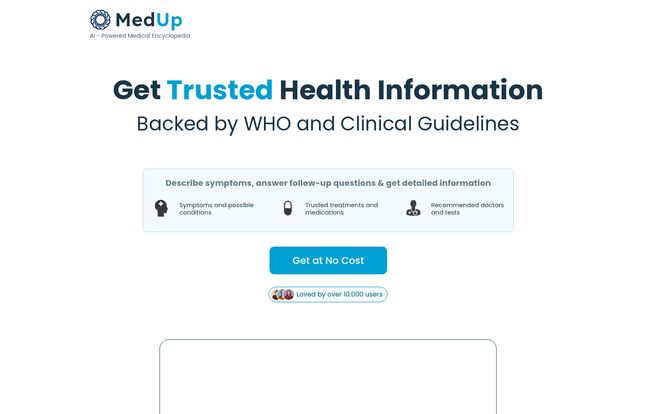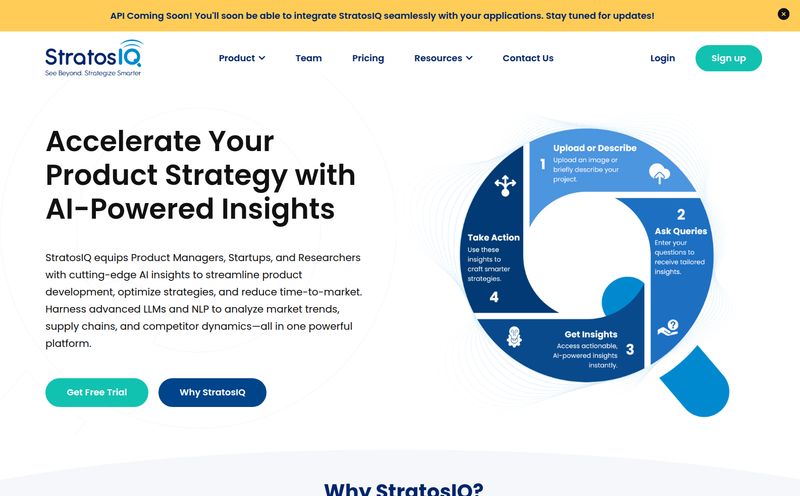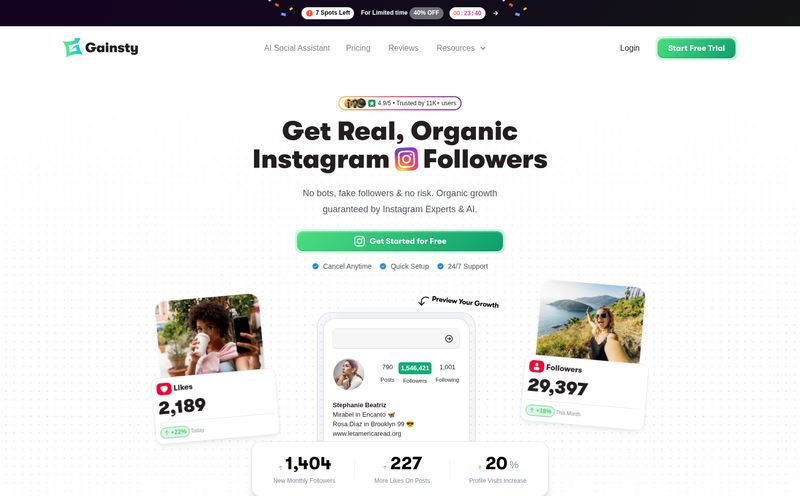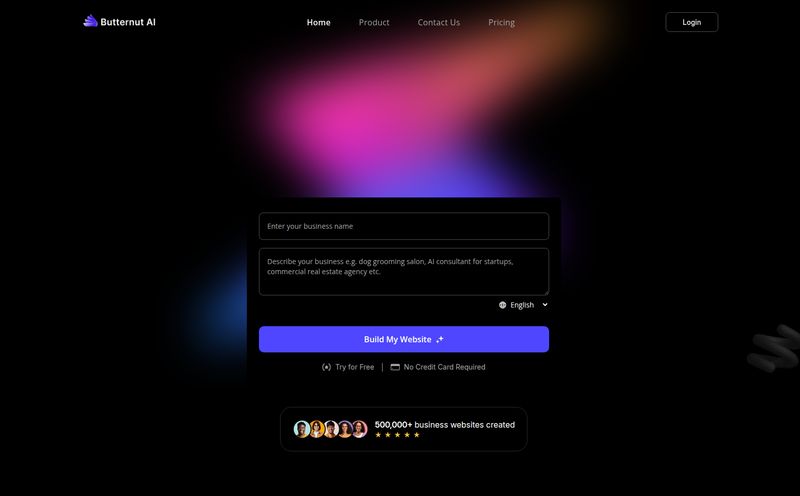It’s 2 AM. You’ve got a weird twitch in your eye, a mysterious rash, or a cough that just won’t quit. What do you do? If you’re like most of us, you pull out your phone and type your symptoms into a search bar. And so begins the terrifying spiral down the rabbit hole of “Dr. Google,” where a simple headache quickly morphs into a rare, incurable brain disease.
I’ve been there. You’ve been there. We’ve all convinced ourselves we have three days to live based on a poorly written forum post from 2009.
For years, as an SEO and trends guy, I've watched the search traffic for health symptoms skyrocket. It's a testament to our collective anxiety and our desire for immediate information. The problem? The internet is a chaotic, crowded bazaar of questionable remedies and outright misinformation. Finding reliable, evidence-based health information can feel like panning for gold in a river of mud.
So when I heard about Med Up, an AI-powered medical encyclopedia, my professional curiosity was piqued. But I was also skeptical. Another “AI doctor” app? No thanks. But this one claimed to be different, using information backed by the World Health Organization (WHO) and other clinical guidelines. And it's free. Okay, now you have my attention.
So, What Exactly is Med Up?
Let's get this straight from the get-go. Med Up isn't trying to be your doctor. It's more like a super-smart, incredibly well-researched medical librarian. Its mission, as stated on its site, is to make high-quality medical information freely accessible to everyone. A noble goal, for sure.
At its core, it's a platform where you can describe your symptoms, and an AI will ask you intelligent follow-up questions to narrow things down. It then provides you with detailed information about possible conditions, potential treatments, and even what kind of doctor you might want to see. Think of it as a guided tour through a medical textbook, but one that actually speaks plain English.

Visit Med Up
The entire system is built on a foundation of trust. It doesn't just pull information from the ether; it relies on established, verified sources like the WHO. In an age of deepfakes and AI-generated nonsense, that's a pretty big deal.
Putting Med Up to the Test: A First-Hand Account
To give it a fair shake, I decided to take it for a spin. The interface is clean and simple, centering around a chat window. No clutter, no ads trying to sell you miracle supplements. Just a straightforward prompt to start the conversation.
I decided to test it with something common. “I have a persistent dry cough and I feel tired,” I typed in.
Immediately, the AI responded, not with a list of horrifying diseases, but with clarifying questions. “How long have you had the cough?” “Do you have a fever?” “Any shortness of breath?” This felt… responsible. It was mimicking the triage process a real nurse or doctor might use. It wasn't jumping to conclusions.
After a few more questions, it presented a list of possibilities, from the common cold and bronchitis to more specific environmental triggers. Each possibility came with a detailed explanation, typical symptoms, and—this is the part that really impressed me—proof links. You could click to see the source of the information directly. Transparency, what a concept!
The Standout Features of Med Up
After playing around with it for a while, a few things really stood out as being more than just marketing fluff.
Information Sourced from Reputable Guides
This is the big one. In the world of online health, your source is everything. The fact that Med Up anchors its knowledge base in guidelines from the World Health Organization and other clinical bodies gives it immediate credibility. It’s not just scraping content from random health blogs. It’s a curated, vetted experience. This commitment to sourcing is probably its biggest advantage over a standard search engine.
It Goes Beyond a Simple Symptom Check
Many symptom checkers stop after giving you a list of potential ailments. Med Up takes it a step further. It provides information on trusted treatments and medications associated with the conditions it describes. More importantly, it helps you understand the next step by suggesting what kind of specialist to consult, whether it's a general practitioner, a pulmonologist, or a dermatologist. This bridges the gap between information and action.
Designed for Real Human Beings
Accessibility is clearly a priority here. First off, it’s free. This removes a significant barrier for many people. Second, the interface is incredibly user-friendly. But the inclusion of voice, text, and even photo inputs is a thoughtful touch. Have a weird-looking mole? You can (in theory, as per their feature list) snap a photo. This multi-modal approach means it’s useful for a much broader range of people, including those who might struggle with typing or prefer to speak naturally.
The Big, Bold Disclaimer: Med Up Is NOT Your Doctor
Alright, let's have a serious chat. This is probably the most important part of this whole article. For all its strengths, Med Up has one very clear, very important limitation: it only provides educational information.
It cannot, and should not, give you a diagnosis. An AI, no matter how sophisticated, does not know your medical history, your lifestyle, your genetics, or the hundred other subtle factors a human doctor considers. The user reviews on their own site even echo this, with one user saying it helped them “formulate what I needed to make an appointment for.” That’s the perfect use case.
"Think of Med Up as the tool you use to prepare for the meeting, not the meeting itself. It helps you walk into your doctor's office with smarter questions and a better understanding of what might be going on. It’s a tool for information, not a tool for diagnosis, and thats a critical distinction."
Never, ever use this or any other online tool as a replacement for professional medical advice. If you are feeling unwell, your first call should always be to a qualified healthcare professional. Seriously. The American Medical Association and other national health bodies have resources to help you find a doctor in your area.
So Who Is This Tool Really Built For?
I see a few clear groups of people who would get a ton of value from Med Up:
- The Anxious Googler: For anyone who immediately fears the worst, Med Up can provide a calmer, more structured, and less terrifying way to research symptoms.
- The Proactive Patient: This is for the person who wants to be an active participant in their healthcare. Using Med Up before a doctor’s appointment can help you organize your thoughts and ask more targeted questions.
- Parents and Caregivers: When a child has a non-emergency symptom, it can provide quick, reliable information to help you decide if it’s a “wait and see” situation or if it’s time to call the pediatrician.
- The Curious Learner: If you just want to understand a medical condition better without wading through dense medical journals or sketchy blogs, it's a fantastic educational resource.
About That 'Free' Price Tag
In the digital world, we’re conditioned to be wary of “free.” It usually means we’re the product. So, how can Med Up be free? Based on their mission-driven language, it seems to be an effort to genuinely democratize access to quality health information. They believe this knowledge shouldn't be locked behind a paywall. I have to say, it’s a refreshing take. There are no pricing tiers or premium features mentioned, which simplifies things greatly. It’s just free. For now, at least, we can take that at face value and appreciate the gesture.
Frequently Asked Questions About Med Up
1. How does Med Up actually work?
Med Up uses an AI trained on a vast database of medical knowledge sourced from the World Health Organization and other clinical guidelines. When you input your symptoms, the AI uses a conversational process to ask follow-up questions, then cross-references your answers with its database to provide information on possible conditions, treatments, and next steps.
2. Can Med Up give me a medical diagnosis?
Absolutely not. The platform is very clear that it provides educational information only and is not a substitute for a professional medical diagnosis. You must consult a qualified healthcare professional for any medical advice or diagnosis.
3. Is Med Up really free to use?
Yes, based on all available information on their website, the service is completely free to use. Their mission is to make medical information widely and freely accessible.
4. What sources does Med Up use for its information?
Its primary sources are the World Health Organization (WHO) and other established clinical guidelines. A key feature is the inclusion of “proof links,” allowing users to see the original source of the information provided.
5. How is this different from just Googling my symptoms?
The main difference is curation and structure. Google gives you a chaotic mix of everything—reputable sources, forums, ads, and blogs. Med Up provides a structured, guided experience using only vetted, credible sources. It’s designed to reduce anxiety, not amplify it.
6. Is my personal health information safe?
While the website has a standard privacy policy, you should always be cautious about what personal health information you share online. For general symptom checking, it's a powerful tool, but always review the platform's privacy policy to understand how your data is handled.
My Final Verdict on This AI Health Companion
After spending some quality time with Med Up, I'm walking away cautiously optimistic. This isn't the AI doctor of science fiction, and that's a good thing. It knows its place. It's a powerful, well-designed, and responsible tool for what it is: a medical encyclopedia on steroids.
It successfully tackles the biggest problem with online health searches—reliability. By tethering itself to sources like the WHO, it provides a safe harbor in the stormy seas of internet misinformation. For the average person looking to become a more informed patient, Med Up is a fantastic step in the right direction. Just promise me you'll still call your doctor, okay?
Reference and Sources
- World Health Organization (WHO): https://www.who.int/
- American Medical Association (AMA): https://www.ama-assn.org/



